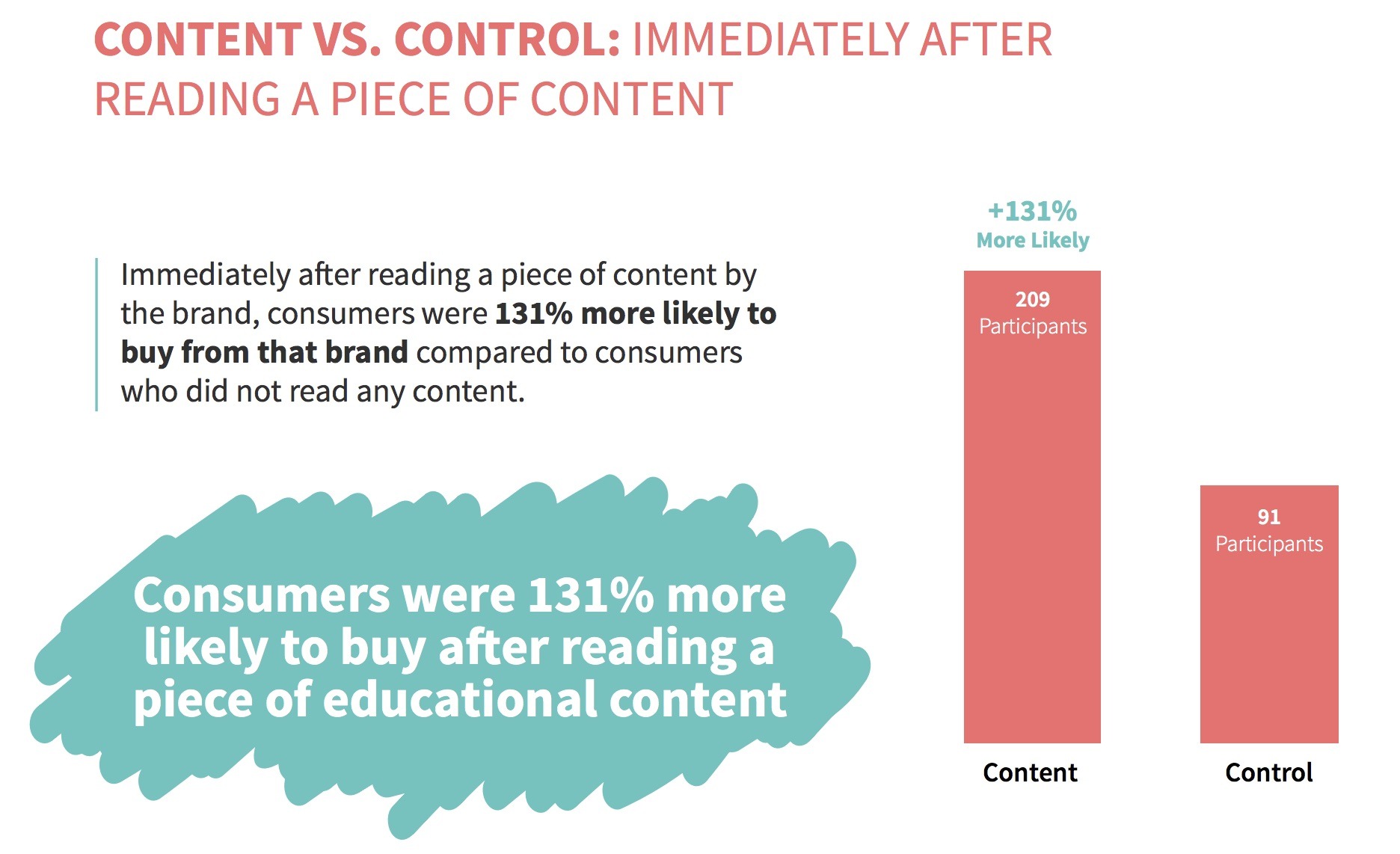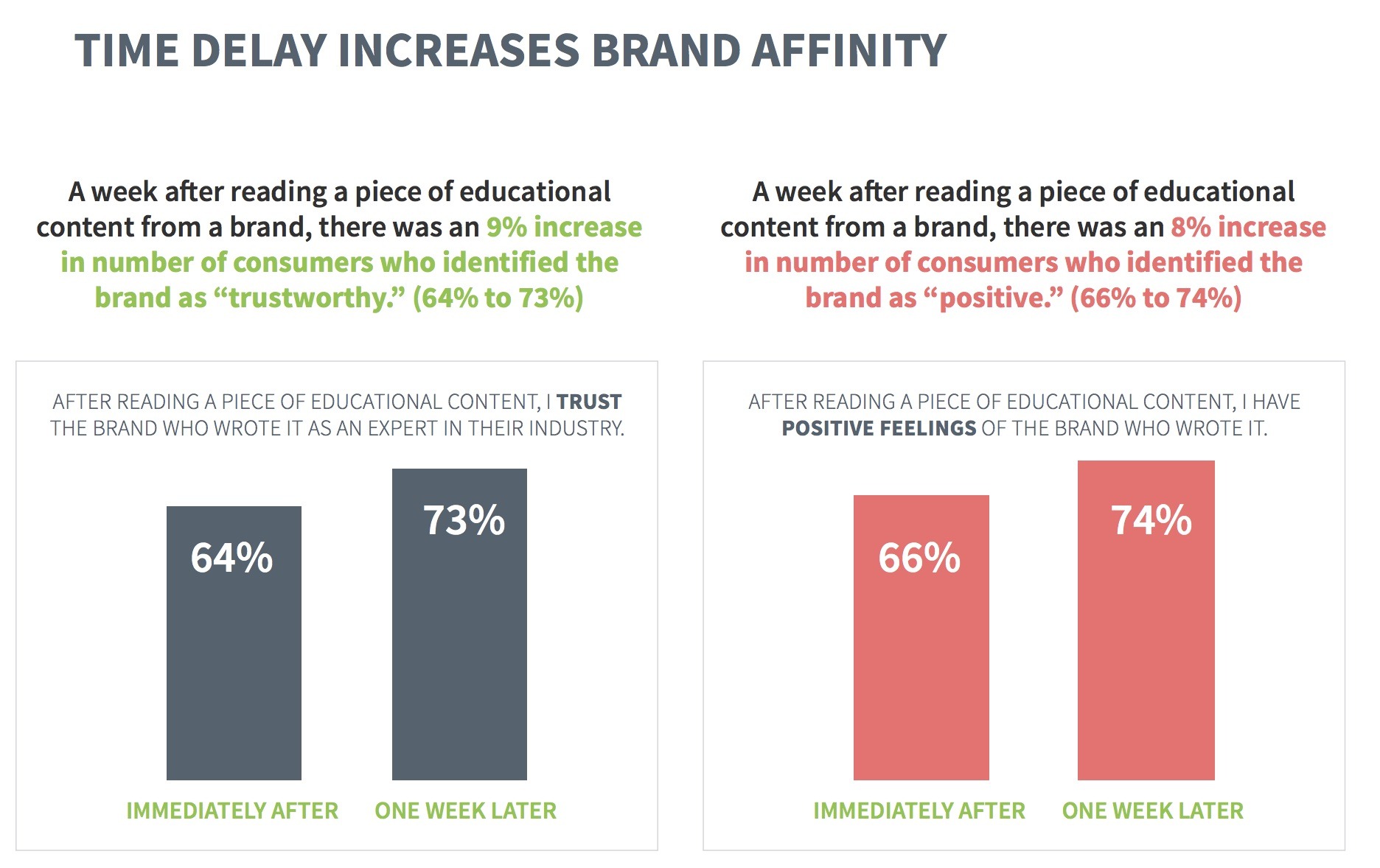A whopping 76% of marketing executives reported that they are increasing their investment in content marketing this year, yet the power of content marketing is often called into question when it comes to budget allocations.
We can see growing proof of the evolution of content in the digital wild: brands answering consumer questions with educational content, enticing readers to enter into their marketing funnel.
While content marketing is clearly important to brands, it is notoriously difficult to measure. In fact, less that 5% of enterprise companies can clearly attribute the impact of content on revenue.
Why it’s hard to measure content marketing
Why is it so difficult to measure the impact of content marketing – particularly top-of-funnel educational content? Here are two major reasons:
- The digital journey is deeply fractured. Since reading educational content is often several steps away from a purchase, consumers switch contexts, intents, and devices, making it hard for businesses to follow the thread of influence.
- It’s hard to measure the impact of helping. Educational content is unique in its utility. Consumers seek it out when they need help solving problems, making decisions, and finding solutions.
Can we put a KPI on a feeling of gratitude or relief we feel towards someone who’s answered a question that’s on our minds? No wonder it’s difficult to measure content’s impact.
And yet, difficult as it is to measure, content is having a big effect on consumers. As marketing leaders, we need better insight into the influence we have.
Customer engagement for the modern customer.
Get the CX solutions HERE.
The power of content marketing: An experiment with astonishing results
In order to demystify content’s impact, we conducted an experiment.
The results were staggering: in a study of 1000 consumers, people were 131% more likely to buy from brands that educated them with content.
Even more stunning: content makes consumer trust and brand affinity grow over time.
The study on content’s influence was led by the team at Conductor with rigorous oversight from academic researchers. In the simplest terms: half of our test subjects read educational content, and half did not.
The educational articles were “authored” by mock brands – it was important to ensure subjects did not enter the experiment with existing biases.
- How to Make Almond Milk (written by KitchenTech Blenders)
- Throwing a Party This Summer? Here are 25 Backyard Party Ideas (written by PowerSoundz)
- Backpacking 101: What You Need To Know to Get Started (written by Ozawa Peak Outfitters)
We surveyed participants immediately after they read the content, and again a week later to understand the impact of time.
This aspect was particularly important to reflect the reality of the fractured digital journey – more often than not, time elapses between reading educational content and reengaging with a brand.
We tested the impact of content on 3 main factors:
- Purchase power: Whether content made them more or less likely to purchase from the authoring brand
- Brand Affinity: Whether content influenced a consumer’s feelings about the brand in a positive or negative way
- Consumer Trust: The impact of reading content on the feelings of trust a consumer has for that brand
It gets better with time: Brand affinity increases as time passes
When given a lineup of 4 brands to purchase from, consumers were 131% more likely to buy from a brand immediately after consuming early-stage, educational content.

A week later, the impact of content marketing was still strong – consumers were still 48% more likely to buy from the brand that educated them.
And now, the really fascinating result: a week after reading the content, consumers actually found that brand more trustworthy and had a greater affinity than when they immediately read the content.
Trust and affinity increased by about 10% over a week, even though those consumers had no further exposure to those brands.
Think about it in your world – a consumer reads educational content your team creates. That makes them about 64% more likely to trust your brand. A week passes. Suddenly, with no further touchpoints, they’re 73% more likely to trust your brand.
That’s amazing! As consumers interact with content, their brand affinity actually compounds with time, rather than diminishes.

If you’re interested in understanding the consumer psychology behind this behavior, check out this interview with web psychologist Nathalie Nahai.
The power of content marketing: Content becomes more valuable over time
Most things we do in marketing are just flashes in the pan.
Most of our campaigns and marketing efforts fade as soon as we turn our attention away. Worse, we’re often creating interruptions; we’re setting up obstacles our customers maneuver around instead of valuable destinations that they’re actively seeking.
Content is – and can be – different.
Content has the power to create relationships and real bonds with consumers. And as our investment in content marketing grows, it’s important to understand and articulate its importance so that we can deliver even more value.

